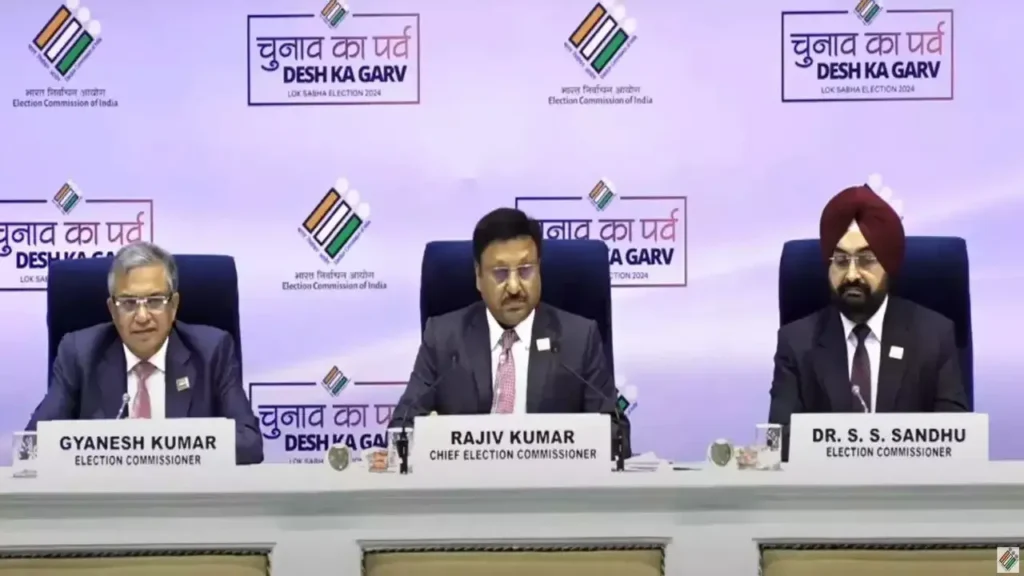The Lok Sabha elections in 2024 are not just a democratic exercise but a reflection of the nation’s aspirations and values. As the Election Commission of India (ECI) unveils the detailed schedule for the electoral process, the entire country gears up for a momentous event that will shape the course of governance for the coming years. With each phase of polling, voters will exercise their fundamental right to choose their representatives, contributing to the vibrant tapestry of Indian democracy. Understanding the Electoral Schedule: The Lok Sabha elections in 2024 are scheduled to commence on April 19 and will be conducted in seven phases, culminating in the announcement of results on June 4. The phased approach ensures efficient management and widespread participation across the diverse regions of the country. The Lok Sabha Election 2024 schedule unfolds in seven meticulously planned phases, each covering a diverse array of states and union territories, with their unique political landscapes and demographic compositions. In Phase I, slated for April 19, voters from 21 states and union territories will cast their ballots across 102 Lok Sabha constituencies. From the northeastern states of Arunachal Pradesh, Assam, and Manipur to the heartland states of Bihar, Madhya Pradesh, and Rajasthan, this phase encompasses a wide geographic spread, reflecting the nation’s rich diversity. Moving on to Phase II, scheduled for April 26, the electoral process extends to 13 states, with 89 parliamentary constituencies up for grabs. States like Karnataka, Maharashtra, and Uttar Pradesh witness significant polling activity during this phase, underscoring their political significance in shaping the national narrative. Phase III, set for May 7, sees polling across 12 states and union territories, covering 94 Lok Sabha constituencies. From the vibrant landscapes of Gujarat and Karnataka to the politically crucial battlegrounds of Uttar Pradesh and West Bengal, this phase captures the essence of India’s democratic ethos. May 13 marks Phase IV, with polling spanning 10 states and union territories, encompassing 96 parliamentary constituencies. From the coastal regions of Andhra Pradesh and Odisha to the hinterlands of Jharkhand and Madhya Pradesh, this phase witnesses a diverse array of electoral dynamics at play. Phase V, slated for May 20, focuses on 49 Lok Sabha constituencies across 8 states, including Bihar, Maharashtra, and Uttar Pradesh. With each phase, the electoral process gains momentum, drawing closer to the culmination of results on June 4. Phase VI, scheduled for May 25, extends to 7 states, covering 57 parliamentary constituencies. From the national capital territory of Delhi to the agrarian landscapes of Uttar Pradesh and West Bengal, this phase underscores the democratic fervor resonating across the country. Finally, Phase VII, held on June 1, witnesses polling in 57 Lok Sabha constituencies across 8 states and union territories. From the picturesque landscapes of Himachal Pradesh to the bustling streets of Punjab and Uttar Pradesh, this phase brings the curtain down on a monumental electoral exercise, paving the way for the announcement of results and the dawn of a new political era on June 4. Key Phases and Constituencies: Each phase of the elections covers specific states and union territories, with varying numbers of constituencies. From April 19 to June 1, voters will cast their ballots in different regions, shaping the political landscape for the next term of governance. Notably, states like Uttar Pradesh, Maharashtra, and West Bengal witness multi-phase polling due to their large electorate and diverse demographics. Importance of Model Code of Conduct: The announcement of election dates triggers the enforcement of the Model Code of Conduct (MCC), which guides the conduct of political parties and candidates during the electoral process. The MCC ensures a level playing field and prohibits the ruling government from making policy decisions that could influence voters. Political Dynamics and Party Strategies: The Lok Sabha elections serve as a battleground for various political parties, with the incumbent NDA government aiming for a rare third term. Conversely, opposition parties, united under the INDIA bloc, view the elections as an opportunity to challenge the ruling coalition’s dominance and advocate for democratic values. Voter Outreach and Participation: With approximately 97 crore eligible voters, voter outreach and participation are crucial aspects of the electoral process. The ECI, along with political parties and civil society organizations, endeavors to ensure maximum voter turnout by providing essential facilities and promoting awareness campaigns. Looking Ahead: As the nation gears up for the Lok Sabha elections, the political landscape undergoes dynamic shifts, reflecting the aspirations and concerns of diverse communities. The electoral process serves as a cornerstone of democracy, empowering citizens to exercise their right to choose their representatives and shape the future of the country. The Lok Sabha elections in 2024 represent a significant milestone in India’s democratic journey, marked by extensive preparations, spirited campaigns, and the collective voice of millions of voters. Through active engagement and informed decision-making, citizens contribute to the vibrant tapestry of Indian democracy, ensuring a brighter and inclusive future for generations to come.


